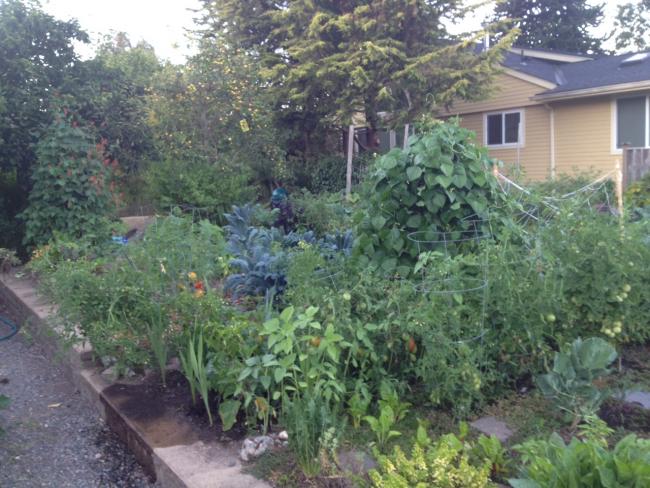At Large in Ballard: Sanctuary
Thyme P-Patch Garden has a two year waiting list for plots.
Wed, 08/05/2015
By Peggy Sturdivant
My sister says that I exaggerate my stories. I am not exaggerating when I say that in high school French we spent an entire semester just reading, Voltaire’s Candide, or Optimism (1758). I think this experience culled all but one potential French major from the same group of 24 girls and two boys tracking their entire way together through 4-5 years of French.
Nor do I exaggerate when I confess that after even more French in college I landed at a University in the Southern France incomprehensible to native French speakers and essentially illiterate in the language. I blame Voltaire.
I’m kidding. What is to blame is a non-immersive curriculum and a vapid American teenager in the 70s who had to blow-dry her hair every morning. And yet, the last words of Candide always run through my mind like one of those songs you can’t get unstuck. Il faut cultiver notre jardin.
We have to cultivate our garden. The story of the naïf Candide is practically the story of any clueless hero or heroine on an epic quest. It’s “The Wizard of Oz” when Dorothy starts clicking those heels and repeating, “There’s no place like home.” The French wouldn’t be growing corn in their fields except for animal feed but it still translates to roaming the wide world only to discover there’s nothing like working the home field, even if it’s just a few containers on the Juliette balcony.
I keep thinking of Candide’s concluding words as I navigate our increasingly political neighborhood landscape. After meetings which leave me with more questions than answers I need to get bare hands into dirt, feeling deep for the roots of weeds to cleanse myself of circular arguments. If people who are living on the street aren’t eligible for social services unless they’re in a shelter, but they can’t get into a shelter because they’re living on the street…I can tell I’m frustrated when I start weeding randomly. Anywhere. Parking strips, traffic circles.
The only vegetables I ate as a child were cucumbers and tomatoes, now growing my own food is one my greater pleasures (at least harvesting). My garden is my sanctuary this summer to work through my thoughts. ‘No politics in the column this week’ I told my husband this morning. Throughout the day as I’ve voiced my concerns about the community meeting scheduled for Monday, August 3rd (that is not the City’s to be announced meeting on the proposed transitional encampments) my husband reminds me, “No politics.” No politics seems impossible right now.
Many hot hours I don’t garden because I have that choice. I also have the gift of a home and place to garden. Even if I didn’t have a home wouldn’t it help me to be able to grow food? Why can’t we resurrect the idea of World War II’s Victory Gardens as a way of making headway against social injustice? There I go again, combining thinking and gardening. Candide concluded they don’t mix.
Any knowledge of Voltaire or his role in Natural Philosophy, Newtonianism (as in Sir Isaac) or the Enlightenment Movement was wasted on us in 8th grade French, and on me to this day. Voltaire’s Candide was a satire that fell on plugged ears even before the invention of the Walkman. We might have understood satire if “Rowan & Martin’s Laugh-In” was an example, but the distinction between topical and philosophical was moot for most of us.
All we knew was that young Candide journeyed from misfortune to disaster, witnessing natural and man-made horrors. Now in the age of banned books I wonder about what’s referred to online as, “uncommonly graphic accounts of the sexual exploitation of women.” We trudged our way through the book week after week, quiz after quiz for 30 chapters. Unlike the Biblical Adam and Eve, cast out of the garden, Candide and his companions finally return to home and garden having experienced the ugliness of the outside world. They want to labor in the garden and grow food, too tired from hard work to philosophize. Me too.


